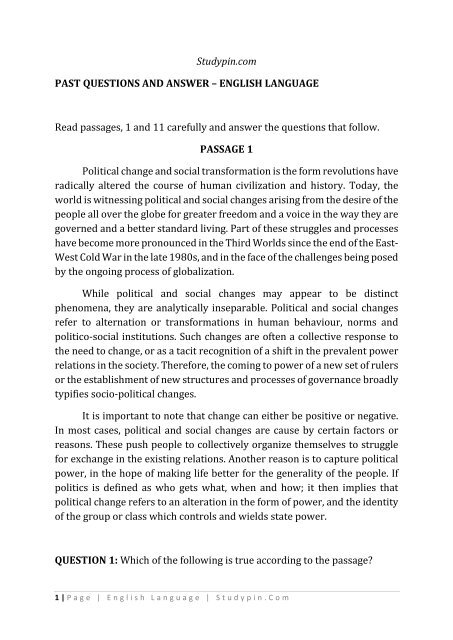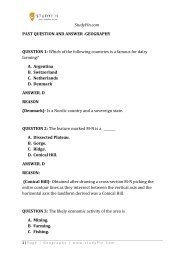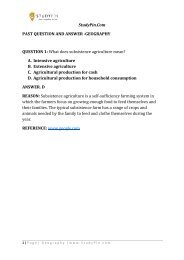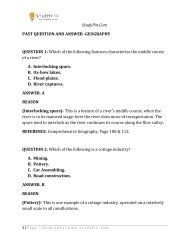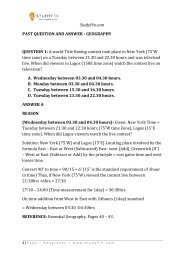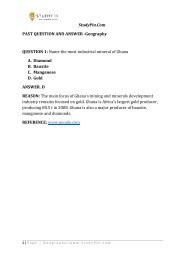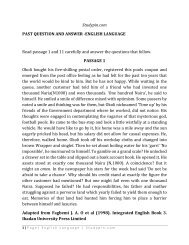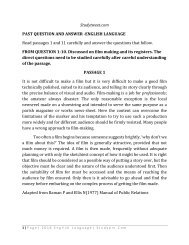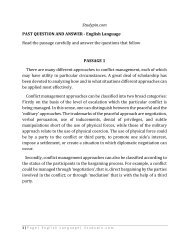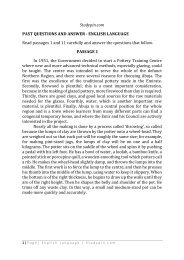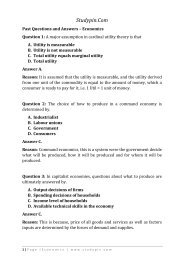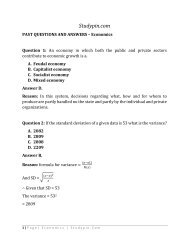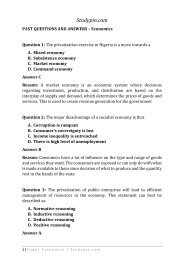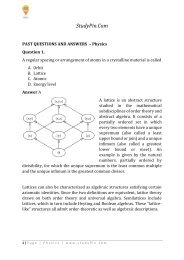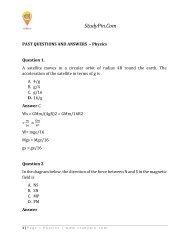You also want an ePaper? Increase the reach of your titles
YUMPU automatically turns print PDFs into web optimized ePapers that Google loves.
Studypin.com<br />
PAST QUESTIONS AND ANSWER – ENGLISH LANGUAGE<br />
Read passages, 1 and 11 carefully and answer the questions that follow.<br />
PASSAGE 1<br />
Political change and social transformation is the form revolutions have<br />
radically altered the course of human civilization and history. Today, the<br />
world is witnessing political and social changes arising from the desire of the<br />
people all over the globe for greater freedom and a voice in the way they are<br />
governed and a better standard living. Part of these struggles and processes<br />
have become more pronounced in the Third Worlds since the end of the East-<br />
West Cold War in the late 1980s, and in the face of the challenges being posed<br />
by the ongoing process of globalization.<br />
While political and social changes may appear to be distinct<br />
phenomena, they are analytically inseparable. Political and social changes<br />
refer to alternation or transformations in human behaviour, norms and<br />
politico-social institutions. Such changes are often a collective response to<br />
the need to change, or as a tacit recognition of a shift in the prevalent power<br />
relations in the society. Therefore, the coming to power of a new set of rulers<br />
or the establishment of new structures and processes of governance broadly<br />
typifies socio-political changes.<br />
It is important to note that change can either be positive or negative.<br />
In most cases, political and social changes are cause by certain factors or<br />
reasons. These push people to collectively organize themselves to struggle<br />
for exchange in the existing relations. Another reason is to capture political<br />
power, in the hope of making life better for the generality of the people. If<br />
politics is defined as who gets what, when and how; it then implies that<br />
political change refers to an alteration in the form of power, and the identity<br />
of the group or class which controls and wields state power.<br />
QUESTION 1: Which of the following is true according to the passage?<br />
1 | P age | <strong>English</strong> <strong>Language</strong> | Studypin.Com
A. Change is inestimable.<br />
B. Change is invaluable.<br />
C. Change is inevitable.<br />
D. Change is inimitable.<br />
ANSWER. C<br />
REASON: Change like death is inevitable.<br />
QUESTION 2: It can be deducted from the passage that political and social<br />
changes are<br />
A. Antithetical.<br />
B. Independent.<br />
C. Repulsive.<br />
D. Intertwined.<br />
ANSWER. D<br />
REASON: They are inseparable for a better living.<br />
QUESTION 3: A suitable title for this passage is<br />
A. The Struggle for political power.<br />
B. Elements of politics.<br />
C. Social Change and Political Environment.<br />
D. Reasons for Political Change.<br />
ANSWER. C<br />
2 | P age | <strong>English</strong> <strong>Language</strong> | Studypin.Com
QUESTION 4: The word alteration as used in the passage means<br />
A. Recognition.<br />
B. Modification.<br />
C. Complication.<br />
D. Multiplication.<br />
ANSWER. B<br />
REASON: Modification or improvement. It means a charge or alteration,<br />
usually to make something work better.<br />
PASSAGE 2<br />
Like all reptiles, snakes are cold blooded, or more correctly,<br />
ectothermic- they cannot produce their own body heat; instead, they rely on<br />
the sun to heat their bodies. Because they do not rely on energy from the<br />
food to generate body heat, snakes can survive on an extremely meager diet.<br />
Some wait for months between successive meals and a few survive by eating<br />
a large meal just once or twice a year. When they do eat snakes swallow their<br />
prey whole rather than biting off small. Many snakes have specialized jaws<br />
that enable them to swallow animals that are far larger than their own heads.<br />
Although uncommon, some snakes, such as the Africa rock Python, have<br />
been observed eating animals as large as an antelope or a small cow.<br />
With over two thousand five hundred species belonging to more than<br />
ten families, snakes are a large and successful group. They owe much of this<br />
success their versatility- snakes occupy habitat ranging from underground<br />
burrows to the top of the tree, to ocean depths as great as one hundred and<br />
fifty metres. They are found on every continent except Antarctica and<br />
although they are most abundant in tropical areas, many survive in regions<br />
marked extreme cold. The only place without snakes are parts of the polar<br />
regions and isolated islands, such as the Republic of Ireland and New<br />
Zealand as opposed to places in Nigeria like Plateau and Gombe States in the<br />
Northern part where there is large population of snakes.<br />
QUESTION 5: It can be inferred from the passage that snakes are<br />
3 | P age | <strong>English</strong> <strong>Language</strong> | Studypin.Com
A. Voracious cow eaters.<br />
B. Great insect eaters.<br />
C. Homogeneous reptiles.<br />
D. Heterogeneous creatures.<br />
ANSWER. D<br />
REASON: of different and of many species.<br />
QUESTION 6: The most notable thing about snakes, according to the<br />
passage is that they<br />
A. Are versatile in reproduction.<br />
B. Eat big but seldom.<br />
C. Exist in families.<br />
D. Abound in Gombe and Plateau States.<br />
ANSWER. C<br />
REASON: Exist in families – They flock together in families.<br />
QUESTION 7: Which of the following is true according to the passage?<br />
A. Snakes are endemic on every continent.<br />
B. There is countless number of snakes in the Republic of Ireland.<br />
C. Snakes are seldom seen at the Antarctica.<br />
D. Snakes are not in the polar region.<br />
ANSWER. D<br />
REASON: They don’t exist in the Polar Regions because of the severe cold<br />
and snow.<br />
QUESTION 8: It can be deducted from the passage that snakes have<br />
4 | P age | <strong>English</strong> <strong>Language</strong> | Studypin.Com
A. Visible internal locomotive organs.<br />
B. No visual sense of measurement.<br />
C. Large appetite for antelopes.<br />
D. No external auditory organs.<br />
ANSWER. D<br />
REASON: No external auditory organs means that snakes don’t have ears.<br />
QUESTION 9: A suitable title for this passage is<br />
A. Some characteristic of snakes.<br />
B. Snakes as Legless, Cold-blooded Reptiles.<br />
C. Species of Snakes in Nigeria and other Lands.<br />
D. Feeding Habits of Snakes.<br />
ANSWER. D<br />
REASON: Paragraph one from line 4 – 14 of the passage!<br />
PASSAGE 3<br />
The passage below has gaps numbered 10 to 19. Immediately<br />
following each gap, four options are provided. Choose the most<br />
appropriate option for each gap.<br />
Setting up a newspaper involves a lot of preparations. The ….10…. [A.<br />
Lithographer B. Proprietor C. Sub-editor D. Processor] has to employ<br />
lot of people. Other people working with him are cartographers, editors,<br />
typesetter, and readers. Who work in various ways to produce the text of<br />
the newspaper…11…. [A. Reporters B. Analyst C. Vendors D. Agents],<br />
who go out and collect stories and item of news, and….12…. [A.<br />
Distributors B. Listeners C. Newscasters D. Correspondents], who<br />
specialize in one kind to topic? Another important person who works<br />
closely with the Editor-in-Chief is the….13…. [A. News-editor B.<br />
Proofreader C. Reporter D. Announcer]….14…. [A. Writers B. Agents C.<br />
Producers D. Sub-editors] go through stories sent to them and make<br />
necessary adjustment.<br />
5 | P age | <strong>English</strong> <strong>Language</strong> | Studypin.Com
The Editor-in-Chief could determine for instance, whether a<br />
particular journalist should write articles daily or weekly in a particular<br />
column. Such a journalist is known as ….15…. [A. A composer B. A<br />
columnist C. An essayist D. A freelancer]. The editorials of the<br />
newspaper will be coordinated by….16…. [A. An editorial board B. All<br />
readers C. An agent D. A guild of researchers].<br />
The publisher could decide to establish…17.... [A. Column B. A<br />
magazine C. A gazetteer D. An article] which would be on sale weekly,<br />
fortnightly or monthly….18….[A. A contrast for B. A contrast to C. A<br />
contrast from D. A contrast in] the eye catching, screaming headlines and<br />
captions of newspapers on sales every day from the….19…. [A.<br />
Distributors B. Pressman C. Salesman D. Readers].<br />
QUESTION 10: B<br />
REASON: This is words associated with printing and publishing – Lexis and<br />
structure. The business owner, or holder of property.<br />
QUESTION 11: A<br />
REASON: They get information and news for the articles. Reporters are<br />
journalists who researches, writes and reports on information in order to<br />
present in sources, conduct interviews, engage in research and make<br />
reports.<br />
REFERENCE: www.wikipedia.org.com<br />
QUESTION 12: D<br />
REASON: It is correspondents not ‘B’ as stated. Listeners have nothing to<br />
do with printing and publishing. Correspondents or on-the-scene reporters<br />
are journalists or commentators for magazines, or more speaking, agents<br />
who contributes reports to a newspaper, or radio or television news, or<br />
another type of company, from remote, often distance, location.<br />
6 | P age | <strong>English</strong> <strong>Language</strong> | Studypin.Com
REFERENCE: www.wikipedia.org.com<br />
QUESTION 13: A<br />
REASON: He is the next to the Editor – in – chief for the assists in collating<br />
the data, processing and proofreading before printing.<br />
QUESTION 14: D<br />
REASON: Sub-editors, edit, proof-read and determine which article is to be<br />
published.<br />
QUESTION 15: B<br />
REASON: Columnists are always assigned to write an article on specific<br />
dates/periods.<br />
QUESTION 16: A<br />
REASON: There is always an Editorial Board for every printing and<br />
publishing agency who co-ordinate every printing/publishing.<br />
QUESTION 17: B<br />
REASON: Newspaper or magazine as the publisher deem fit. The decision<br />
to publish on the newspaper or magazine rest on the publisher<br />
QUESTION 18: B<br />
7 | P age | <strong>English</strong> <strong>Language</strong> | Studypin.Com
QUESTION 19: A<br />
REASON: Distributors as vendors sells newspapers and magazine and not<br />
pressmen.<br />
FROM QUESTION 20 – 29; Read the novel titled “the Potter’s Wheel” by<br />
Chukwuemeka Ike.<br />
QUESTION 20: Chief Okeke Okafo decided to buy an ‘Iron horse’ because it<br />
would<br />
A. Raise his status in the clan.<br />
B. Minimize the strain of travel from one town to another.<br />
C. Give him the opportunity to act like the District Commissioner.<br />
D. Allow him to be the head of the clean.<br />
ANSWER. B<br />
QUESTION 21: ….the vanquished dragon, spewing stand instead of fire gave<br />
a solemn and humiliating pledge that he would never cross Obu’s path.<br />
From the above, the word ‘Vanquished’ means<br />
A. Unconcerned.<br />
B. Sensitive.<br />
C. Subdued.<br />
D. Unflappable.<br />
ANSWER. C<br />
REASON: Subdued means overcome, quicken or being under control (a<br />
feeling or person).<br />
REFERENCE: http://en.oxforddictionaries.com<br />
QUESTION 22: In the novel, the suspicion that Obu was an Ogbanje had<br />
revalued the<br />
8 | P age | <strong>English</strong> <strong>Language</strong> | Studypin.Com
A. Disappearance of Obu in standard 1.<br />
B. Price tag Mazi Laza and his wife placed on Obu<br />
C. Particioation of Obu as amember of the masquerade group.<br />
D. Time Obu spent at Teacher’s house.<br />
ANSWER. A<br />
QUESTION 23: According to the novel, a pupil who ‘carried his class’ would<br />
be instructed to<br />
A. Fetch firewood for the teachers.<br />
B. Carry a pad.<br />
C. Clean the latrines.<br />
D. Dance on the assembly ground.<br />
ANSWER. A<br />
QUESTION 24: If you get confused at any stage, let me know; I want this<br />
pottage to be well prepared.<br />
The statement above was meant to<br />
A. Encourage Ada’s cooking habit.<br />
B. Confuse Obu.<br />
C. Test Obu’s cooking skills.<br />
D. Distract Ada.<br />
ANSWER. A<br />
QUESTION 25: According to the novel, Mazi Laza would shout at any<br />
person standing in his way because his bicycle<br />
9 | P age | <strong>English</strong> <strong>Language</strong> | Studypin.Com
A. Was manufactures by local engineers.<br />
B. Had fully brakes and outdated pedals.<br />
C. Came from the same stock as Chief Okeke’s.<br />
D. Had injured people on many occasions.<br />
ANSWER. B<br />
QUESTION 26: From the novel, the first person to own a bicycle in<br />
Umuatulu clan was<br />
A. Polycarp’s father.<br />
B. Mazi Lazarus.<br />
C. Teacher Zacheaus Kanu.<br />
D. Chief Okeke Okafo.<br />
ANSWER. D<br />
QUESTION 27: In the novel, what did Mazi Laza do after putting a pinch of<br />
snuff into each nostril?<br />
A. He gave the remaining to Nwobiara.<br />
B. He nodded with satisfaction.<br />
C. He complained of the stuff.<br />
D. He commended his wife.<br />
ANSWER. B<br />
QUESTION 28: In the novel, what was Ada’s punishment for the fighting<br />
with Madam?<br />
10 | P age | <strong>English</strong> <strong>Language</strong> | Studypin.Com
A. She fetched water from the stream with a basket.<br />
B. She ate only once a day for one week.<br />
C. She scrubbed the school latrine for one week.<br />
D. She copied Psalm 119 from start to finish.<br />
ANSWER. C<br />
QUESTION 29: In the novel, Obu would not touch cocoyam soup because<br />
he claimed it.<br />
A. Would get stuch in his throat.<br />
B. Would make him sick.<br />
C. Was not well prepared.<br />
D. Had lost its taste.<br />
ANSWER. B<br />
From Question 30 – 34, Read the Novel Titled “The Successor” by Jerry<br />
Agada for Full Details<br />
QUESTION 30: The entertainment expenses for Okoh Ameh’s traditional<br />
marriage rites were paid for by<br />
A. The bride’s parents.<br />
B. Okoh Ameh.<br />
C. Terkura Atsen.<br />
D. Okoh Ameh’s parents.<br />
ANSWER. D<br />
QUESTION 31: Mfa’s friend asserted that Bob Marley and other reggae<br />
starts were ‘good’ because they<br />
11 | P age | <strong>English</strong> <strong>Language</strong> | Studypin.Com
A. Were gainfully employed.<br />
B. Listened to their parents.<br />
C. Went to school.<br />
D. Smoked Indian hemp.<br />
ANSWER. D<br />
QUESTION 32: From the novel, what did Terkura do with balance of the<br />
money Chief Ofega paid him?<br />
A. He brought a beautiful house.<br />
B. He invested it in his business.<br />
C. He brought two cars for his father.<br />
D. He married another wife.<br />
ANSWER. B<br />
QUESTION 33: Markudi became more prominent because of the<br />
A. Bridge.<br />
B. International hotel.<br />
C. Railway station.<br />
D. Road.<br />
ANSWER. C<br />
QUESTION 34: In the novel, Maria’s tolerance of her husband spending half<br />
the night on the duty at the hotel was considered a<br />
A. Way to remedy all martial problems.<br />
12 | P age | <strong>English</strong> <strong>Language</strong> | Studypin.Com
B. Necessary price to pay for the success of their marriage.<br />
C. Bad things that couple should discourage.<br />
D. Way of taking a great risk.<br />
ANSWER. B<br />
LEXIS, STRUCTURE AND ORAL FORMS BASED ON IDIOMATIC<br />
EXPRESSION<br />
In each question 35 to 44, select the option that best explains the<br />
information conveyed in the sentence.<br />
QUESTION 35: The minister considered the ministry’s budget to be a drop<br />
in the ocean in view of the number of project in the pipeline.<br />
A. The minister may be dropped for failing to complete a number<br />
of projects.<br />
B. The money approved cannot complete the pipeline project<br />
across the ocean.<br />
C. The pipeline project across the ocean will be abandoned unless<br />
budgetary allocation improves.<br />
D. The amount available may be inadequate for projected<br />
expenditure.<br />
ANSWER. D<br />
REASON: (Insufficient).<br />
QUESTION 36: The police are locking for the woman who farmed her<br />
children out to her neighbours.<br />
13 | P age | <strong>English</strong> <strong>Language</strong> | Studypin.Com
A. The police may arrest the woman for allowing her neighbours to<br />
take care of her children.<br />
B. The woman may be arrested for allowing her children to be a<br />
nuisance to her neighbours.<br />
C. The police wanted the woman for allowing her children to<br />
destroy her neighbours’ crops.<br />
D. The woman and her children are in the habit of working in<br />
neighbours’ farms and police are not well disposed to this.<br />
ANSWER. C<br />
REASON: The police looking to arrest the woman.<br />
QUESTION 37: Jummai’s father remarked that pigs would fly before she<br />
passed<br />
A. It would be possible for her to pass.<br />
B. He would have to bribe her teachers to enable her to pass.<br />
C. She would have to cheat in order to pass.<br />
D. It would be possible to pass only if she worked harder.<br />
ANSWER. A<br />
REASON: It is impossible for pigs to get wings and fly.<br />
QUESTION 38: The president said that he found himself between a rock<br />
and a hard place when the press said that he had resigned.<br />
A. He thought that hard places were unsafe.<br />
B. He had a hard decision to make.<br />
C. Hard places are dangerous for the president.<br />
D. He dreamt that he was abandoned.<br />
ANSWER. B<br />
REASON: He was indecisive – He could not take decision at that time.<br />
QUESTION 39: Kunana is like a bear with a score head<br />
14 | P age | <strong>English</strong> <strong>Language</strong> | Studypin.Com
A. He is ugly.<br />
B. He is quiet.<br />
C. He is a bully.<br />
D. He is grumpy.<br />
ANSWER. B<br />
REASON: Very calm and gentle.<br />
QUESTION 40: Olu gave his brother a bumpy ride.<br />
A. Olu gave his brother a difficult time.<br />
B. Olu gave his brother a ride in his car.<br />
C. Olu’s brother rode on Olu’s back to success.<br />
D. Olu took his brother on a bumpy road.<br />
ANSWER. A<br />
REASON: A difficult situation or time. (He was stubborn).<br />
QUESTION 41: Adeola doesn’t have to go the farm today.<br />
A. Adeola must not got to the farm today.<br />
B. Adeola should not go to the farm today.<br />
C. Adeola may go to the farm today if he so wishes.<br />
D. Adeola ought not to have gone to the farm today.<br />
ANSWER. C<br />
REASON: It a conditional statement for Adeola.<br />
QUESTION 42: My boss asked me to take my eyes off the bail<br />
15 | P age | <strong>English</strong> <strong>Language</strong> | Studypin.Com
A. I should stay off football after sustaining an injury.<br />
B. I should be focused when playing football.<br />
C. I should stop paying attention to what is most important.<br />
D. I should be focused when I am about to stay off football.<br />
ANSWER. A<br />
REASON: Stay often something.<br />
QUESTION 43: The robber was hedged in by the people.<br />
A. The robber was exposed by the people.<br />
B. The robber was caught by the people.<br />
C. The robber was surrounded by the people.<br />
D. The robber was killed by the people.<br />
ANSWER. C<br />
REASON: To be accosted or surrounding by entity.<br />
QUESTION 44: Many workers are not happy because they live a hand-tomouth<br />
life.<br />
A. They are barely surviving.<br />
B. They are rejected the use of spoons.<br />
C. They work hard with their hands.<br />
D. They are voracious and avaricious.<br />
ANSWER. A<br />
REASON: Having not enough for a living.<br />
FROM QUESTION 45-54, CHOOSE THE OPTION OPPOSITE IN MEANING<br />
TO THE WORD OR PHRASE IN ITALICS.<br />
16 | P age | <strong>English</strong> <strong>Language</strong> | Studypin.Com
Are antonyms which are opposites; which needs the reader to find the<br />
meaning of the word emphasized first before getting the opposite<br />
QUESTION 45: Prolonged strike action debilitated the industry.<br />
A. Isolated.<br />
B. Weakened.<br />
C. Destroyed.<br />
D. Invigorated.<br />
ANSWER. D<br />
REASON: Invigorate is a verb which means someone feel fresher, healthier,<br />
and more energetic, while invigorated is the past participle of invigorate.<br />
REFERENCE: http://dictionary.cambridge.org<br />
QUESTION 46: One of the students bought a plagiarized copy of the book.<br />
A. An original.<br />
B. A revised.<br />
C. An annotated.<br />
D. A used.<br />
ANSWER. A<br />
REASON: Original means the earliest form of something, from which copies<br />
may be made<br />
REFERENCE: www.google.com<br />
QUESTION 47: The young girl was taken back by her father’s gift of a car.<br />
17 | P age | <strong>English</strong> <strong>Language</strong> | Studypin.Com
A. Unmoved.<br />
B. Surprised.<br />
C. Nonplussed.<br />
D. Shocked.<br />
ANSWER. A<br />
REASON: Unmoved means not feeling any emotion<br />
REFERENCE: http://dictionary.cambridge.org<br />
QUESTION 48: Musa is a gifted but erratic player.<br />
A. Regular.<br />
B. Unpredictable.<br />
C. Unstable.<br />
D. Strong.<br />
ANSWER. C<br />
REASON: Not composed. Unstable means to lack stability, meaning things<br />
could change without warming like an unstable shelf that is likely to fall<br />
down. Unstable also mean likely to fail; not firmly established.<br />
REFERENCE: www.google.com<br />
QUESTION 49: The lamp shades were translucent.<br />
A. Interested.<br />
B. Luminous.<br />
C. Transparent.<br />
D. Opaque.<br />
ANSWER. C<br />
REASON: Translucent means transparent. Opposite- Opaque-dark.<br />
QUESTION 50: My niece has an unquenchable thirst for adventure stories.<br />
18 | P age | <strong>English</strong> <strong>Language</strong> | Studypin.Com
A. An illegitimate.<br />
B. A reduced.<br />
C. An inextinguishable.<br />
D. A spurious.<br />
ANSWER. B<br />
REASON: Unstoppable thirst-uncontrollable. Opposite -a reduced.<br />
QUESTION 51: Some of my neighbours have an antipathy to dogs.<br />
A. Affection for.<br />
B. Acronym for.<br />
C. Alarm for.<br />
D. Enmity towards.<br />
ANSWER. A<br />
REASON: Dislike dogs- opposite is affection for<br />
QUESTION 52: The dressmaker unpicked the seam of the shirt.<br />
A. Sewed up.<br />
B. Picked up.<br />
C. Tore up.<br />
D. Threaded.<br />
ANSWER. C<br />
REASON: Sewed up means unpicked. Opposite -tore up.<br />
QUESTION 53: The testimony of the witness was vague.<br />
19 | P age | <strong>English</strong> <strong>Language</strong> | Studypin.Com
A. True.<br />
B. Ambiguous.<br />
C. Clear.<br />
D. Disturbing.<br />
ANSWER. C<br />
REASON: Vague means unclear or ambiguous. Therefore, is the opposite of<br />
vague because clear means transparents or pellucid; free from cloudiness<br />
or impurities.<br />
REFERENCE: www.google.com<br />
QUESTION 54: As a student, Isa tried communal living for a few years.<br />
A. General.<br />
B. Shared.<br />
C. Private.<br />
D. Collective.<br />
ANSWER. C<br />
REASON: Communal means collective or general. Private means belonging<br />
to or for. The use of one particular person or group of people only which<br />
automatically the opposite of collective.<br />
REFERENEC: www.google.com<br />
FROM QUESTIONS 55-64, CHOOSE THE OPTION NEAREST IN MEANING<br />
TO THE WORD OR PHRASE IN ITALICS.<br />
QUESTION 55: The chairman admires incessant meetings.<br />
A. Planned.<br />
B. Constant.<br />
C. Irregular.<br />
D. Unusual.<br />
ANSWER. B<br />
20 | P age | <strong>English</strong> <strong>Language</strong> | Studypin.Com
REASON: Constant means occurring continuously over a period of time.<br />
REFERENCE: www.google.com<br />
QUESTION 56: Today’s weather is favourable for a game for tennis.<br />
A. Abnormal.<br />
B. Disapproving.<br />
C. Encouraging.<br />
D. Impartial.<br />
ANSWER. B<br />
REASON: Favourable means enticing or encouraging. Encouraging means<br />
giving someone support or confidence, supportive.<br />
REFERENCE: https://en.oxforddictionaries.com<br />
QUESTION 57: All the candidates looked aghast at the first reading of the<br />
question.<br />
A. Dismayed.<br />
B. Satisfied.<br />
C. Relaxed.<br />
D. Fulfilled.<br />
ANSWER. A<br />
REASON: Filled with horror and surprise. Dismayed means very upset,<br />
disappointed, or annoyed about something surprising or shocking that has<br />
happened.<br />
REFERENCE: www.macmilandictionary.com<br />
QUESTION 58: Joke gave Muhammed a jaunty smile.<br />
21 | P age | <strong>English</strong> <strong>Language</strong> | Studypin.Com
A. An inviting.<br />
B. A frightful.<br />
C. A cheerful.<br />
D. A discouraging.<br />
ANSWER. A<br />
REASON: Inviting or an encouraging act.<br />
QUESTION 59: The first round of the tournament was a doddle.<br />
A. Balanced.<br />
B. Dodgy.<br />
C. Exasperating.<br />
D. Easy.<br />
ANSWER. D<br />
REASON: Very easy for a game. Easy means without difficulty or effort.<br />
REFERENCE: www.google.com<br />
QUESTION 60: The lazy man cast a lustful glance at his neighbour’s wife.<br />
A. Quick.<br />
B. Covetous.<br />
C. Envious.<br />
D. Hateful.<br />
ANSWER. B<br />
REASON: Covetous or greedy. It means having or showing a great desire to<br />
possess something belonging to someone else.<br />
REFERENCE: www.google.com<br />
QUESTION 61: They accused him of fomenting political unrest.<br />
22 | P age | <strong>English</strong> <strong>Language</strong> | Studypin.Com
A. Discouraging.<br />
B. Preventing.<br />
C. Guiding.<br />
D. Inciting.<br />
ANSWER. D<br />
REASON: Planning or leading a situation. Inciting is the present participle<br />
of incite. Incite means to encourage or stir-up (violent or unlawful<br />
behaviour).<br />
REFERENCE: www.google.com<br />
QUESTION 62: You can learn a great deal just watching other players.<br />
A. Accumulate.<br />
B. Allow.<br />
C. Discover.<br />
D. Invent.<br />
ANSWER. C<br />
REASON: Discover, find or achieve. Discover means to find unexpectedly or<br />
during a search.<br />
REFERENCE: www.google.com<br />
QUESTION 63: All the researchers were asked to gamer information on the<br />
new viral infection.<br />
A. Disseminate.<br />
B. Distort.<br />
C. Give.<br />
D. Collect.<br />
ANSWER. D<br />
REASON: Collect, Collate, find, seek.<br />
23 | P age | <strong>English</strong> <strong>Language</strong> | Studypin.Com
QUESTION 64: The dispute between the two countries has resulted in the<br />
severing of diplomatic relations.<br />
A. Securing.<br />
B. Swapping.<br />
C. Strengthening.<br />
D. Breaking.<br />
ANSWER. D<br />
REASON: Destroying, weakening, breaking.<br />
From questions 65-84, consist of prepositions which suppose to the<br />
best words to complete a statement. It also includes concord words of<br />
agreement. Subject and verb agreement<br />
QUESTION 65: The House and The senate will…. At noon next Wednesday<br />
to hear a special address by the president<br />
A. Adjourn.<br />
B. Rise.<br />
C. Collude.<br />
D. Convene.<br />
ANSWER. D<br />
REASON: Convene means to come or bring together for a meeting or<br />
activity; assemble.<br />
REFERENCE: www.google.com<br />
QUESTION 66: At the….of the century, many ways of doing things were<br />
introduced<br />
A. Event.<br />
B. Birth.<br />
C. Sight.<br />
D. Turn.<br />
ANSWER. D<br />
24 | P age | <strong>English</strong> <strong>Language</strong> | Studypin.Com
QUESTION 67: You may have the pencil, but you can’t have the ballpoint….<br />
A. Furthermore.<br />
B. Also.<br />
C. As well.<br />
D. Either.<br />
ANSWER. B<br />
QUESTION 68: The president said that the country was not out of the….yet<br />
A. Fog.<br />
B. Water.<br />
C. Wood.<br />
D. Forest.<br />
ANSWER. C<br />
QUESTION 69: He went to the restaurant to enjoy the special….<br />
A. Cuisine<br />
B. A la carte<br />
C. Chef<br />
D. Suite<br />
ANSWER. A<br />
REASON: Cuisine means meals. A Cuisine is a style of cooking characterized<br />
by distinction ingredients, techniques and dishes; usually associated with a<br />
specific culture or geographic region.<br />
REFERENCE: www.wikipedia.org<br />
25 | P age | <strong>English</strong> <strong>Language</strong> | Studypin.Com
QUESTION 70: The invigilator….to know how long the examination…going<br />
on<br />
A. Want/had been.<br />
B. Wants/have been.<br />
C. Wanted/had been.<br />
D. Wanted/has been.<br />
ANSWER. C<br />
REASON: A future progressive sentence.<br />
QUESTION 71: The guard spent all the night pacing….<br />
A. Fro and to<br />
B. To and from.<br />
C. To and fro.<br />
D. From and to.<br />
ANSWER. C<br />
REASON: To and fro means going and coming on a distance.<br />
QUESTION 72: The woman refused to testify….her husband<br />
A. At.<br />
B. Against.<br />
C. From<br />
D. In.<br />
ANSWER. B<br />
REASON: Against means in opposition to<br />
REFERENCE: www.google.com<br />
26 | P age | <strong>English</strong> <strong>Language</strong> | Studypin.Com
QUESTION 73: Abike must have found the very interesting movie quite…<br />
A. Absorbing.<br />
B. Nauseating.<br />
C. Perverting.<br />
D. Absolving.<br />
ANSWER. A<br />
REASON: Understanding, taken in, is assimilating. It is also interesting;<br />
engrossing.<br />
REFERENCE: www.google.com<br />
QUESTION 74: The words….divided between the ends of one line<br />
A. Have being.<br />
B. Has been.<br />
C. Has being.<br />
D. Have been.<br />
ANSWER. D<br />
REASON: Plural subject (words) with the concord “have” “been” the verb<br />
attracts plural verb.<br />
QUESTION 75: Those… are very beautiful<br />
A. Flowers of her’s.<br />
B. Our flowers.<br />
C. Flowers of ours.<br />
D. Flowers of her.<br />
ANSWER. C<br />
27 | P age | <strong>English</strong> <strong>Language</strong> | Studypin.Com
QUESTION 76: Cooking has never been Jumoke’s…..<br />
A. Purview.<br />
B. Style.<br />
C. Forte.<br />
D. Recital.<br />
ANSWER. C<br />
REASON: Occupation, interest. Forte is a thing at which someone excels<br />
REFERENCE: www.google.com<br />
QUESTION 77: When the strike is over, there will probably be an increase<br />
in wages and a….increase in prices<br />
A. Concordant.<br />
B. Concurrent.<br />
C. Chronic.<br />
D. Sporadic.<br />
ANSWER. B<br />
REASON: A happening at the same time.<br />
QUESTION 78: My mother was …….annoyed with me for coming late<br />
A. Neither.<br />
B. Hotly.<br />
C. Just.<br />
D. Very.<br />
ANSWER. D<br />
REASON: The degree sense of the annoyance showed by the adverb “very”<br />
28 | P age | <strong>English</strong> <strong>Language</strong> | Studypin.Com
QUESTION 79: The chairman is too much ……an idealist for the<br />
government.<br />
A. About.<br />
B. Of.<br />
C. With.<br />
D. From.<br />
ANSWER. B<br />
REASON: Too aggressive, too supportive, bent on.<br />
QUESTION 80: The clock ……12 o’clock two hours ago<br />
A. Strike.<br />
B. Struck.<br />
C. Striking.<br />
D. Strikes.<br />
ANSWER. B<br />
REASON: Struck is the past tense of strike, make a sound, hit.<br />
QUESTION 81: What is the jury’s ….. The matter?<br />
A. Verdict from.<br />
B. Verdict at.<br />
C. Verdict with.<br />
D. Verdict on.<br />
ANSWER. D<br />
REASON: Verdict means judgment on it.<br />
29 | P age | <strong>English</strong> <strong>Language</strong> | Studypin.Com
QUESTION 82: The unconscious man was …… after receiving first aid<br />
A. Reformed.<br />
B. Restored.<br />
C. Revived.<br />
D. Reawakened.<br />
ANSWER. C<br />
REASON: Bring back life, regained consciousness.<br />
QUESTION 83: The laughter…..his face for a moment<br />
A. Controlled.<br />
B. Animated.<br />
C. Remade.<br />
D. Improved.<br />
ANSWER. B<br />
REASON: Ignited or showing pictures. Animated means full of life or<br />
excitement; lively.<br />
REFERENCE: www.google.com<br />
QUESTION 84: She traced her family history…..matrilineal descent.<br />
A. By.<br />
B. With.<br />
C. At.<br />
D. In.<br />
ANSWER. A<br />
REASON: The prepositional word is “by” the mother’s lineage.<br />
30 | P age | <strong>English</strong> <strong>Language</strong> | Studypin.Com
FROM QUESTION 85-87, CHOOSE THE OPTION THAT HAS THE SAME<br />
VOWEL SOUND AS THE ONE REPRESENTED BY THE LETTER(S)<br />
UNDERLINED.<br />
QUESTION 85: Cool<br />
A. Luke.<br />
B. Look.<br />
C. Should.<br />
D. Full.<br />
ANSWER. A<br />
QUESTION 86: Odour<br />
A. Sugar.<br />
B. Hold.<br />
C. Floor.<br />
D. Flow.<br />
ANSWER. C<br />
QUESTION 87: Palm<br />
A. Florid.<br />
B. Lunch.<br />
C. Plait.<br />
D. Ranch.<br />
ANSWER. D<br />
REASON: Palm is using the sound /αα:/ likewise the word ranch /αα:/<br />
31 | P age | <strong>English</strong> <strong>Language</strong> | Studypin.Com
FROM QUESTION 88-90, CHOOSE THE OPTION THAT HAS THE SAME<br />
CONSONANT SOUNDS AS THE ONE REPRESENTED BY THE LETTER(S)<br />
UNDERLINED.<br />
QUESTION 88: Vision<br />
A. Mansion.<br />
B. Nation.<br />
C. Enclosure.<br />
D. Instruction.<br />
ANSWER. C<br />
REASON: Enclosure means is an area that is surrounded by a barrier.<br />
REFERENCE: www.google.com<br />
QUESTION 89: Gnash<br />
A. New.<br />
B. King.<br />
C. Ring.<br />
D. Forge.<br />
ANSWER. A<br />
QUESTION 90: Epitaph<br />
A. Fan.<br />
B. Paper.<br />
C. Pneumonia.<br />
D. Pseudo.<br />
ANSWER. A<br />
REASON: Epitaph<br />
32 | P age | <strong>English</strong> <strong>Language</strong> | Studypin.Com
THESE ARE RHYMES. THEY ARE WORDS THAT HAVE THE SAME OR<br />
SIMILAR SOUNDS BUT DIFFERENT SPELLING AND DIFFERENT<br />
MEANING<br />
From question 91-93, choose the option that rhymes with the given<br />
word.<br />
QUESTION 91: Ever<br />
A. Fever.<br />
B. Never.<br />
C. Heavier.<br />
D. Favour.<br />
ANSWER. B<br />
REASON: Never means at no time in the past or future, not ever.<br />
REFERENCE: www.google.com<br />
QUESTION 92: Keep<br />
A. Seethe.<br />
B. Threat.<br />
C. Dead.<br />
D. Reap.<br />
ANSWER. D<br />
REASON: Reap means to cut and collect or grain crop. It also mean to<br />
gather, to obtain; to receive as a reward or harvest; or as the fruit of labour<br />
or of work –in a good or a bad sense; as, to reap a benefit from exertions.<br />
REFERENCE: www.google.com<br />
33 | P age | <strong>English</strong> <strong>Language</strong> | Studypin.Com
QUESTION 93: Tax<br />
A. Lacks.<br />
B. Back.<br />
C. Ask.<br />
D. Box.<br />
ANSWER. A<br />
REASON: Lack means the state of being with or not having enough of<br />
something lack is the plural noun of lack.<br />
REFERENCE: www.google.com<br />
FROM QUESTION 94 TO 96, CHOOSE THE MOST APPROPRIATE STRESS<br />
PATTERN FROM THE OPTIONS. THE STRESSED SYLLABLES ARE<br />
WRITTEN IN CAPITAL LETTERS.<br />
QUESTION 94: Valedictory<br />
A. valedicTORY.<br />
B. VAledictory.<br />
C. vaLEdictory.<br />
D. valeDICtory.<br />
ANSWER. D<br />
REASON: Cy-3 rd Syllable from Right-SPI.<br />
QUESTION 95: Congratulation<br />
A. congratuLAtion.<br />
B. CONgratulation.<br />
C. conGRAtulation.<br />
D. congraTULation.<br />
ANSWER. A<br />
REASON: Word of Tory- The First Syllable Must Be Stressed Val.<br />
34 | P age | <strong>English</strong> <strong>Language</strong> | Studypin.Com
QUESTION 96: Conspiracy<br />
A. conspiraCY.<br />
B. conSPIracy.<br />
C. CONspiracy.<br />
D. conspiRAcy.<br />
ANSWER. B<br />
REASON: Words Of Ion- The Second Syllable From The Right Is Stressed-<br />
La.<br />
FROM QUESTION 97-100, THE WORD IN CAPITAL LETTERS HAS THE<br />
EMPHATIC STRESS. CHOOSE THE OPTION TO WHICH THE GIVEN<br />
SENTENCE RELATES.<br />
QUESTION 97: My mother bought a BICYCLE yesterday.<br />
A. Whose mother bought a bicycle yesterday?<br />
B. Did my mother steal a bicycle yesterday?<br />
C. When did my mother buy a bicycle yesterday?<br />
D. What did my mother buy yesterday?<br />
ANSWER. D<br />
QUESTION 98: AMINA went to Abuja by air<br />
A. Who went Abuja by air?<br />
B. Did Amina go to Abuja by road?<br />
C. Did Amina go to Jos by air?<br />
D. Is Amina going to Abuja by air?<br />
ANSWER. A<br />
35 | P age | <strong>English</strong> <strong>Language</strong> | Studypin.Com
QUESTION 99: Musa is STAYING in Enugu.<br />
A. Is Musa staying on the outskirts of Enugu?<br />
B. Is Andu staying in Enugu?<br />
C. Was Musa staying in Enugu?<br />
D. Is Musa passing through Enugu?<br />
ANSWER. D<br />
QUESTION 100: My father READ the newspaper<br />
A. Did my father steal the newspaper?<br />
B. Who read the newspaper?<br />
C. What did my father read?<br />
D. Whose father read the newspaper?<br />
ANSWER A.<br />
REFERENCE<br />
The Best Approach to the Study of <strong>English</strong> Poems by Dr. Anayo .Z. Obayi<br />
Studies in <strong>Language</strong> and Linguistics by Toyin .O. Bamisaye Countdown<br />
<strong>English</strong> by Evans Brothers Publishers<br />
Systematic <strong>English</strong> for School by .S. Oluwayomi Oladunjoye<br />
A Text on Oral <strong>English</strong> by Dr. Lekan .A. Dairo.<br />
36 | P age | <strong>English</strong> <strong>Language</strong> | Studypin.Com


